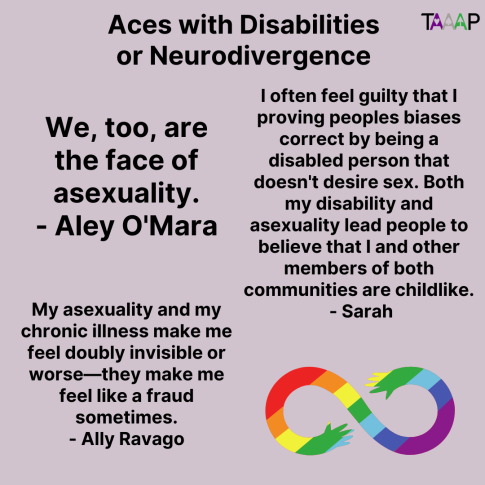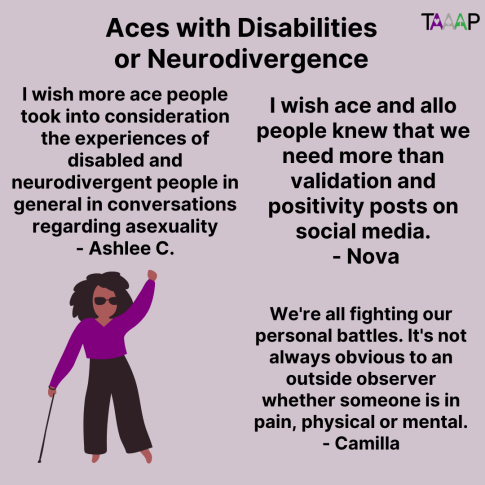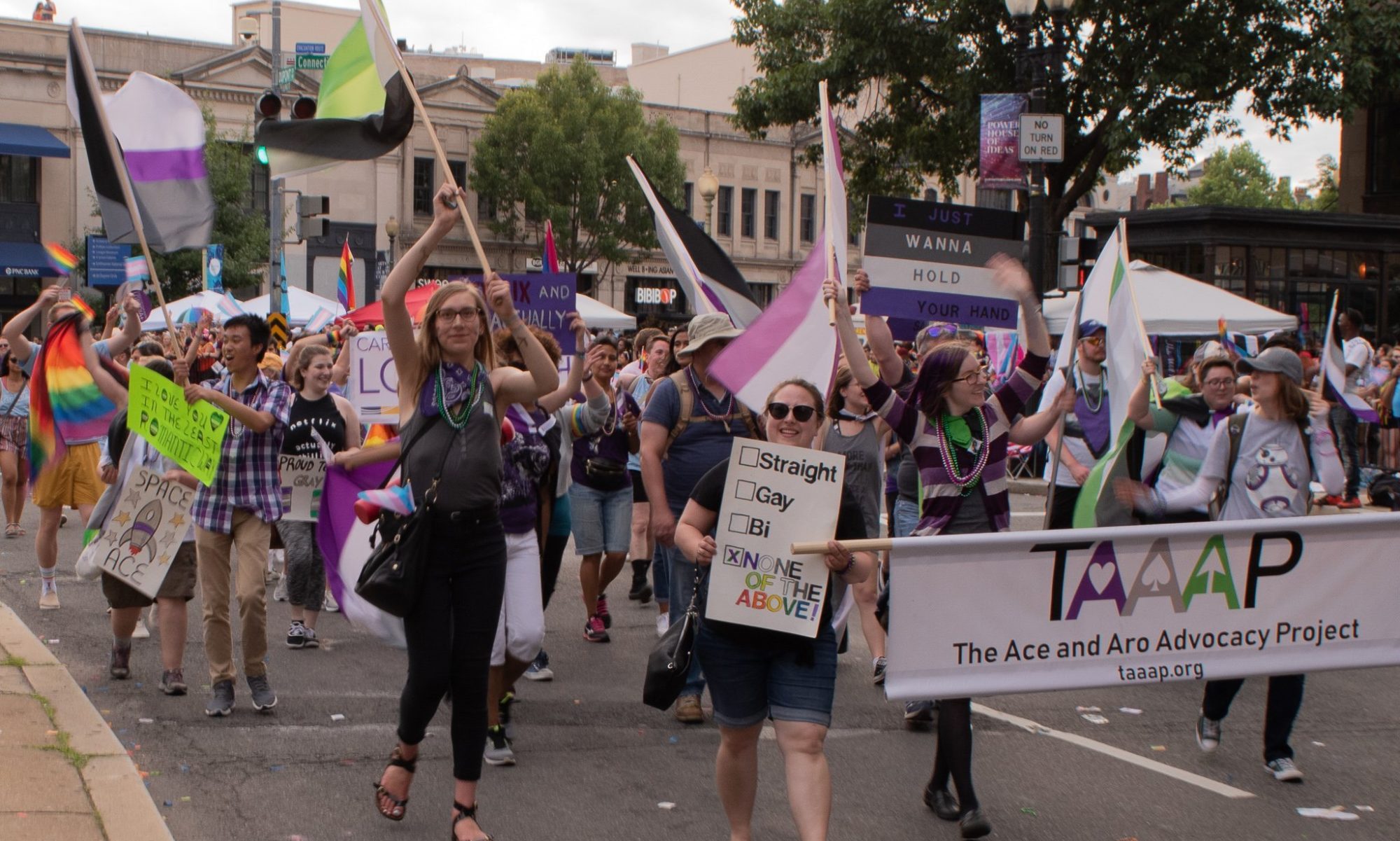

The theme of Ace Week 2021 is “Beyond Awareness” so we wanted to focus on the struggles and issues of specific parts of the ace community – people who are often overlooked by mainstream allosexual people talking about asexuality and even hidden within ace communities.
Asexual people who have disabilities or neurodivergences are often overlooked or ignored, so we wanted to highlight some of their voices. Thank you to all who volunteered their time and shared their experiences.
Introductions
My name is Ashlee C. (they/them). I identify as a bisexual gray-asexual, and I use “neurodivergent” to describe myself.
My name is Aley O’Mara (they/them). I identify as ace, queer, bi, and sapphic. I am neurodivergent (ADHD+ and a variety of mental illnesses).
My name is Ally Ravago and I am a sex-repulsed aromantic asexual. I was diagnosed with systemic lupus erythematosus, or SLE or lupus for short, in 2019.
My first name is Camilla (she/her). My orientation is aromantic asexual. I have a whole snarl of mental intersections that caused a long delay in learning that my asexuality was a valid queer way to be in the world.[…] generalized anxiety disorder, social anxiety disorder, avoidant personality disorder, agoraphobia, and sensory processing issues having to do with noise and touch. The main physical diagnosis that threw me off the trail of AroAceness was premature menopause.
My name is Casper, and I’m a disabled ace (mentally and physically).
My name is Eliott Simpson. I am a panromantic asexual, and am also autistic.
Jesi, Acespec, ADHD/chronic illness/mobility issues
My name is Joshua Godfrey and I am on the Autism spectrum.
My name is Mikhayl, but I go by Mik or Miktastic. I am Asexual and Panromantic (possibly grey aro). I’m Bipolar, Diabetic, and I have chronic fatigue.
I’m Nova. I’m ace and have borderline personality disorder (BPD).
My name is Sarah (she/her) and I am a sex-averse asexual person. I have severe central auditory processing disorder (CAPD).
How does your disability or neurodivergence intersect with your orientation?
AC: I feel as though being neurodivergent affects my perception of sexual attraction & that there are additional queer nuances to attraction I experience because of it. I am also sometimes touch averse or repulsed by the idea of connecting with others, which affects how interested I am in any ideas of contact with others.
AOM: There’s a theory that neurodivergent people are more likely to be queer because the way we perceive the world makes it easier for us to recognize that heteronormativity and cissexism are selling society lies about sexuality and gender. When I was considering going on medication for my depression and OCD, I talked to one of my allo friends about her experience with SSRIs. She mentioned that most of the side effects she’s seen in her friends were sexual dysfunctions, “but who knows, maybe they’ll make you sexual!” Ironically, getting my OCD treated did allow me to be sex-favorable, though I’m still ace!
AR: My asexuality and my chronic illness make me feel doubly invisible or worse—they make me feel like a fraud sometimes.
Camilla: There’s an awful lot to say here. In the 2 years since the queer bombshell was dropped on my head, I’ve pored over my life history, trying to pick apart the signal from the noise. It’s a mess! There were so many red herrings that delayed my self-discovery: …
* In my early 30s, after a brief stint self-identifying as asexual, I dropped the label again when I was officially diagnosed with premature menopause. Surely that was the answer to my lifelong lack of interest in kisses & fucks, right…? When people asked, “Have you had your hormones checked?,” I could officially say YES.
I wish someone had told me that anxiety and AroAceness were not the same thing. I read a lot of self-help books on anxiety and shyness at the behest of my therapist. […] Yet…anxiety couldn’t explain why I never had crushes on any of my peers–never “loved from afar” the way I know that most other shy singles do.
Casper: My chronic pain and PTSD have both affected my sexuality. There’s times I’m sex repulsed or romantically disconnected, but I’m usually sex positive and quite a sap.
ES: My autism has always lead to me struggling with understanding people’s tones, emotions and meanings. This definitely intersected with my asexuality because even today I still completely miss sexual suggestions and innuendoes. Throughout my life I have constantly been oblivious to people flirting and making sexual suggestions towards me, which has been due to both my asexuality and autism converging into one pool of awkward misunderstanding.
JG: I am possibly aspec because i have autism.
Mik: My first psychiatrist believed my asexuality was attributed to mental illness.
Nova: When I was being diagnosed for mental health issues, the final result being a diagnosis of BPD, my aceness was treated as another negative symptom being considered in my eventual diagnosis. My psychiatrist, attempting to reassure me, suggested a lack of desire for certain sexual activity was a trauma symptom to be corrected. I often mirror the people I interact with, or I focus on doing what will make them happy while completely disregarding myself. When interacting with allosexuals, the result can be me doing things that go against my ace needs and desires.
Sarah: When my disorder is more apparent to people (my occasional struggles with speech, odd mannerisms, slow processing, etc.), many people are almost more accepting of my asexuality. Because I am perceived as less intelligent and mature in these instances, most would prefer not to think of me in a sexual way and thus are reassured that I don’t want sex. Disabled people are not usually seen as sexual beings, so this bias people have tends to make them assume that I am too “pure” or too broken to be able to have sex. However, when people are less aware of my disorder (when I am successfully masking my tics and difficulties), my asexuality becomes problematic again. I often feel guilty that I proving peoples biases correct by being a disabled person that doesn’t desire sex. Both my disability and asexuality lead people to believe that I and other members of both communities are childlike.
How is your experience in ace communities impacted by your disability or neurodivergence or your experience with other people with disabilities or neurodivergences impacted by your orientation?
AC: I feel like some people assume all ace people still want romantic relationships, but in reality some do & some don’t. As I am also aromantic & due to my neurodivergency I additionally have a weird & confusing relationship with connecting with others, so that’s not the case for me, & I am off-&-on even romance repulsed at times.
AOM: I find the popular framing of “asexuality is not disability” to be very frustrating. Asexuality is an orientation, and you can position yourself in that orientation from any angle. I don’t know, I don’t care, and it doesn’t matter if my asexuality is “caused” by disability. I’m ace, and the reason why anyone is ace has no bearing on the reality of our positionality.
AR: I feel like aces with disabilities, such as myself, are not much given a spotlight or a platform to talk about our experiences, so I feel sidelined.
Camilla: Shyness and the self-talk of avoidant personality follow me in every group setting: I’m too old & embarrassing. I’m not interesting enough, not cool enough, not using the technology right, not using the lexicon right. I’m half-consciously on the lookout for any curt word or slight irritation in someone’s voice, convinced that’s my cue to begone. The physical reaction feels like a jump-scare.
ES: Like everything else in my life, my autism does lead to me struggling to understand people’s tones or moods or emotions and I have taken things to literally, however I at least feel more at ease knowing that sexual innuendos and genuine sexual suggestions are much more unlikely or not serious in that type of space. As far as I’m aware, my asexuality hasn’t ever dramatically impacted my experience with other people with neurodivergences.
JG: I have found a lot of fellow people who are Neurodivergent online who are also ace.
Sarah: It has been somewhat helpful in bonding with other aces. There are many aces with disabilities, and it can be pleasant to share stories and connect over our shared troubles or achievements.
How could ace communities better support you?
AC: They could better support us by understanding there are additional nuances to being both neurodivergent & asexual simultaneously, & not assuming neurodivergent people’s asexuality is always a product of their neurodivergence.
AOM: We’d all benefit from more nuanced language about asexuality and universal accessibility.
AR: I think ace communities can support me better by letting our voices be heard. I’d like an acknowledgement that we exist and that chronically ill aces are not any less ace.
Camilla: Just to continue to offer a variety of meetups that are both online and in person. I’m not housebound, but anxiety prevents me from travelling too far to unfamiliar places. I’m still screwing up my nerve to do a live meetup.
Casper: Just a general state of “Hey… please don’t forget your disabled siblings” <3
ES: It would be beneficial for ace communities to be aware that some autistic aces can struggle with understanding people’s intentions and tones, and so simple things like clarifying how you’re feeling or what you mean by an expression can help massively in making sure no one misunderstands. Simple awareness alone would be greatly supportive.
JG: Money would be nice. Lol
Sarah: On this front, I think the ace community has been very supportive, I personally have no gripes.
What do you wish ace people knew about you or other aces with disabilities or neurodivergences?
AC: I wish more ace people took into consideration the experiences of disabled & neurodivergent people in general in conversations regarding asexuality, & included our outlooks & viewpoints on it rather than sometimes assuming everyone has the same experiences.
AOM: We, too, are the face of asexuality.
AR: My chronic illness does not make me any less ace, that it is not the reason why I am ace. And for those who are ace because of their disabilities or neurodivergences, they are still valid and important.
Camilla: This is more of a general statement applying to everyone of every orientation. We’re all fighting our personal battles. It’s not always obvious to an outside observer whether someone is in pain, physical or mental. Oftentimes anger and lashing out is just grief in a hot phase, which will melt right back to tearful grief again as soon as the person is alone. Be kind.
Casper: Not all sexualities are affected by trauma, and sometimes trauma makes people hypersexual instead of sex repulsed, or some folx have reclaimed their sexuality after trauma… so associating the two can be either completely unfounded or can even be harmful.
ES: That some autistic aces can struggle with reading emotions and tones and that sometimes it is possible for us to take things to literally or misunderstand what people mean or feel.
Jesi: I wish they knew how helpful and necessary it is for them to ensure that their spaces are accessible. Accessibility is key. Get to know everyone in your community, cultivate those relationships, and learn what people need to be able to access and fully participate in your space!
JG: Autism does not always mean lack of empathy. I work in a senior living center because of my love for uplifting others. I find meaning in what I do.
Sarah: Overall, I think the ace community seems very welcoming and surprisingly knowledgeable about aces with disabilities.
What do you wish allosexual people knew about you or other aces with disabilities or neurodivergences?
AC: I wish more people knew that being asexual & neurodivergent does not automatically make us “cold” or distant, & that they didn’t assume all neurodivergence ace people must be ace because of their neurodivergency.
AOM: Asexuality is not coterminous with disability, but it’s not exclusive of disability.
AR: I wish allosexuals knew that they shouldn’t assume that aces with disabilities are asexual because of our disabilities. And even if it is that way, it doesn’t invalidate us.
Casper: See above!
ES: That sometimes a combination of being both asexual and autistic can lead to a genuine obliviousness or misunderstanding when it comes to reading tones and expressions and that simple clear honesty can help massively in aiding it.
JG: Being neurodivergent does not cancel my ace identity
Mik: Asexuality is a valid sexuality. It’s not caused by mental illness (it can be caused by trauma, but that’s a different beast altogether) and there’s nothing wrong with asexuality.
Nova: I wish ace and allo people knew that we need more than validation and positivity posts on social media. Neurodivergent and ace people are often infantilized, and that isn’t an idea unconnected from anything else, it manifests as barriers and restrictive systems that compound for neurodivergent aces. Many medical systems push people to conform to allosexuality and neurotypicalness, and if they don’t, care can be denied entirely. When people are treated like they can’t make decisions for themselves, others make decisions for them and disregard those people’s actual needs and often ignore their discomfort. I guess the smallest thing would be that when you say things like “don’t infantilize ace/neurodivergent people” or “desexualization isn’t validation of aces”, add in things people can actively do to make neurodivergent aces lives easier. Maybe donate if you can to the kinds of people you want to help, directly or through larger mutual aid efforts.
Sarah: I think allos need to learn that asexuality and disabilities are not one and the same and exist separately from each other. The fact that ace people sometimes have disabilities is not evidence that ace people are innately disabled and disabled people are innately asexual, it just means that some people have disabilities and some do not.
